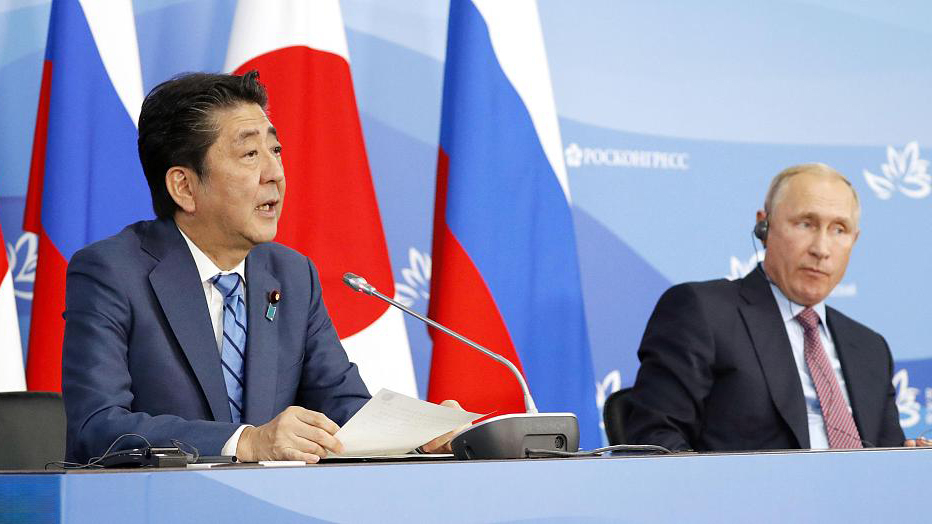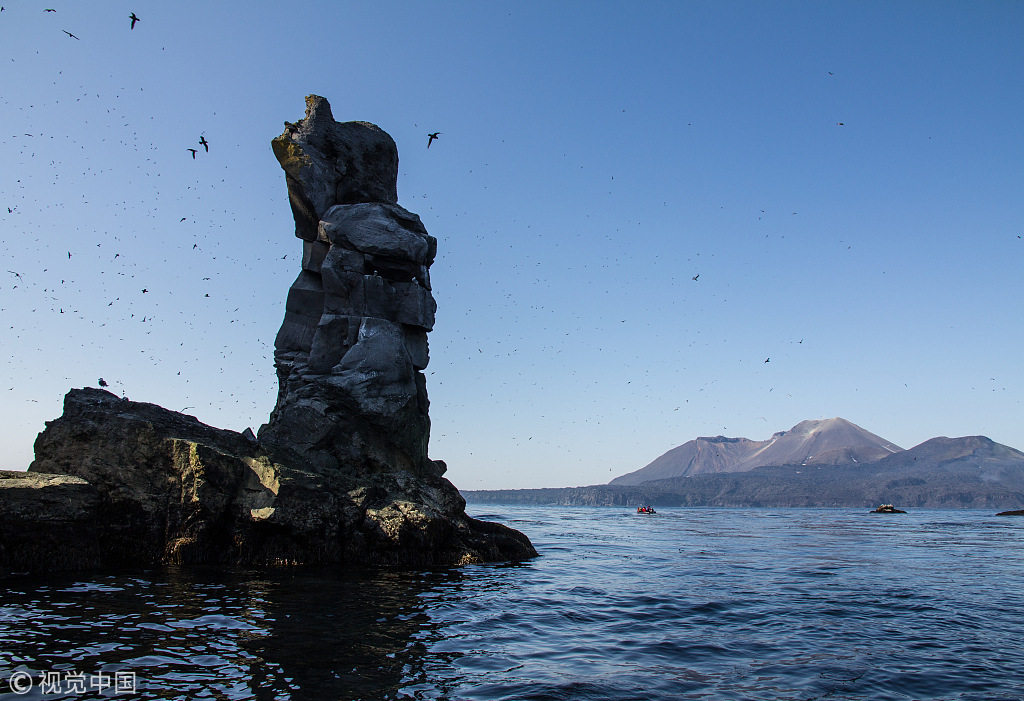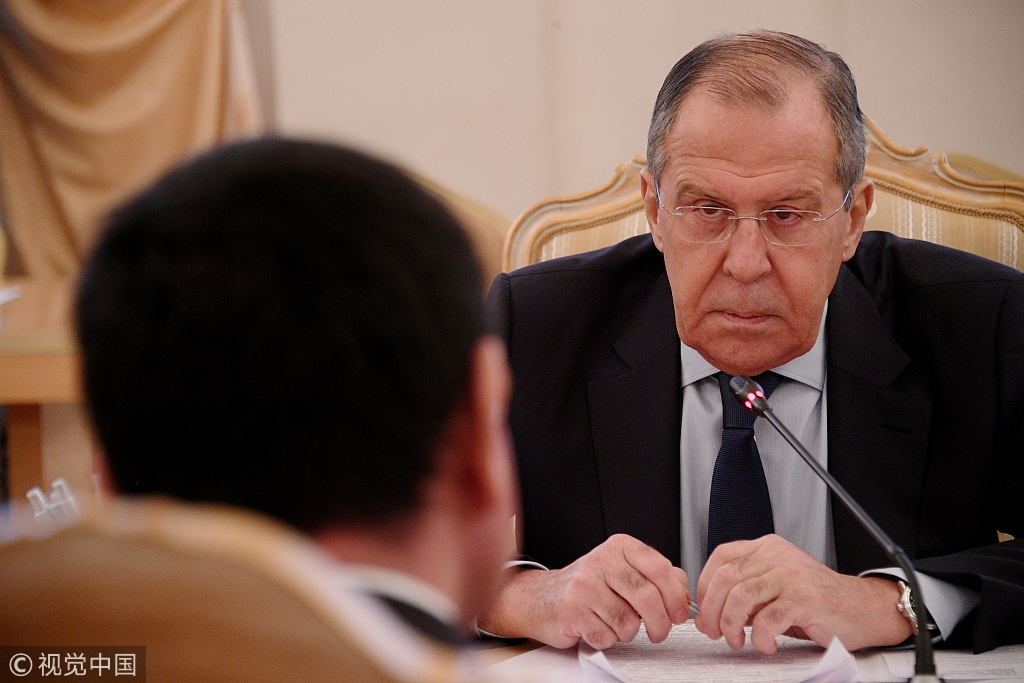
Opinion
08:14, 21-Jan-2019
Opinion: Russia-Japan islands dispute: An impossible deal?
Updated
17:41, 21-Jan-2019
Xiong Lili

Editor's note: Xiong Lili is a professor at the University of International Business and Economics in Beijing. The article reflects the author's opinion, and not necessarily the views of CGTN.
It is hard to believe that seven decades after the end of World War II, Japan and Russia have still not signed a peace treaty. And It is expected that Japanese Prime Minister Shinzo Abe will visit Russia on January 22 for further negotiations on the long-disputed islands that have been standing in the way of reaching an agreement. But so far, the prospects are more than bleak.
The disputes mainly revolve around the sovereignty of the Kuril Islands. The Soviet Union seized the islands, which Japan claims as its territories, at the end of World War II. In October 1956, the two nations signed a declaration stating that the Soviet government had agreed to hand Shikotan and Habomai over to Japan after a treaty is concluded as a gesture of goodwill. But Japan has insisted it should return all four islands.

A view of the Kuril Islands /VCG Photo
A view of the Kuril Islands /VCG Photo
At the last Putin-Abe summit in November, both sides agreed to further their talks based on the declaration, which marks a shift in Japan's tough stance that all disputed four islands should be returned and brings high hopes of success in treaty-reaching. But there are still stumbling blocks that get in the way.
According to the San Francisco Treaty signed in 1951 by 49 countries, including Japan and the United States, Japan must renounce all rights, titles and claims to the Kuril Islands, but in the meantime, it did not recognize the Soviet Union's sovereignty over them either. Thus, no agreements have settled the disputes and much room has been left for debate.
Whether Iturup and Kunashiri are a part of the Kuril Islands remains the most outstanding problem in the territorial dispute. Japan claims that Iturup and Kunashiri are not a part of the Kuril Islands. The Soviet Union rejected the view, and Russia has maintained that same position.
At the conclusion of the bilateral talks on the territorial dispute and peace treaty with the Japanese foreign minister on January 14, 2019, Russian Foreign Minister Sergei Lavrov said that serious differences will remain between the two sides on the territorial dispute unless Japan recognizes at least Iturup and Kunashiri as Russian sovereign territory as a start.

Russian Foreign Minister Sergei Lavrov listens to his Japanese counterpart Taro Kono during their meeting in Moscow, January 14, 2019. /VCG Photo
Russian Foreign Minister Sergei Lavrov listens to his Japanese counterpart Taro Kono during their meeting in Moscow, January 14, 2019. /VCG Photo
The disputable islands are important both economically and militarily due to their abundance of natural resources and their strategic location. Moreover, as Russia is profoundly concerned by the U.S. military presence in Japan, the search for a final resolution is further complicated. As a result, In addition to the sovereignty dispute over Iturup and Kunashiri, when and how Russia should hand over Shikotan and Habomai to Japan also remain disputable. Russia claims that Japan must pledge the islands will not be used by the military in a possible bilateral peace treaty before they are handed over, while Japan claims that Russia should hand over Shikotan and Habomai as the first step and then further talks can be advanced.
However, it is almost impossible for Japan to sacrifice the Japan-U.S. military alliance and U.S. interests to enhance talks with Russia. As early as 1956, the United States tried to intervene and block the deal on the Joint Declaration between Japan and the Soviet Union by asserting that the San Francisco Treaty “did not determine the sovereignty of the territories renounced by Japan” so that “Japan does not have the right to transfer sovereignty over such territories.” Although the United States has always been supporting Japan's claims in the territorial dispute, it is obvious that the United States does not look forward overmuch to intimate links between Japan and Russia.
In spite of the present and potential challenges disturbing the efforts to conclude a peace treaty and find a final resolution to the territorial dispute, the two sides cannot afford to ignore the fundamental reality of their mutual importance to each other as neighboring countries and major global powers. For Japan, if the territorial dispute can be settled, it may pave the way for its international position as a “normal nation.” For Russia, improvement of relations with Japan may bring not only more trade and investment benefits but also some relief of diplomatic isolation with sanctions from the West. Therefore, regardless of whether a final deal on the territorial dispute is reached, Japan and Russia will go on with their efforts to improve bilateral relations.
(Top image: Russian President Vladimir Putin (R) and Japanese Prime Minister Shinzo Abe (L) enter the hall during their meeting at the Eastern Economic Forum in Vladivostok, Russia, September 10, 2018. /VCG Photo)
(If you want to contribute and have specific expertise, please contact us at opinions@cgtn.com.)

SITEMAP
Copyright © 2018 CGTN. Beijing ICP prepared NO.16065310-3
Copyright © 2018 CGTN. Beijing ICP prepared NO.16065310-3